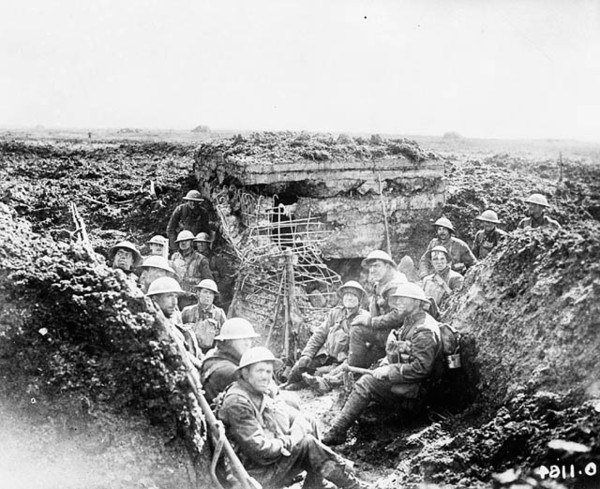The First World War
The First World War is one of the events that profoundly affected the history of many countries early in the 20th century. Canada, a colony of the British empire, took part, as it was required to do by its governing constitutional practices. As a result, the country did not escape the major upheavals caused by the war, initially between 1914 and 1918, and then in the years following. Historians, who constantly adapt their approaches and their questions on the subject, have long recounted the diverse episodes of Canada’s contribution and put forward its various characteristics as well as its many expressions. In recognition of the importance of this cardinal event in our history, during which more than 61,000 Canadians lost their lives and more than 172,000 were wounded, the Dictionary of Canadian Biography/Dictionnaire biographique du Canada (DCB/DBC) has selected it as a topic for presentation to its readers.
This thematic ensemble contains a wealth of different aspects, as can be seen in many of the DCB/DBC biographies. Our organization of material seeks to highlight the military, political, social, and cultural dimensions of this tragic event and thus facilitate an understanding of the themes and the reading of the biographies. Readers will no doubt notice the absence of certain figures such as William Avery (Billy) Bishop, whose deeds also left their mark on this period of turmoil. For now, because their biographies are not yet part of the DCB/DBC, they are not included in the list of the individuals selected.
One of the themes of the unit compels inclusion by its very nature: it deals with the soldiers who fought on European soil and who lost their lives there. While learning about their journeys, readers will also get glimpses of some of the famous battles. Certain individuals (for instance, Jean Brillant and Gordon Muriel Flowerdew) so distinguished themselves that they were awarded the Victoria Cross. Other military figures, such as generals, including Sir Edwin Alfred Hervey Alderson and Sir Arthur William Currie, had to conduct the war itself under conditions that were often difficult both because of the conflict itself and because of strained relations with military and political authorities involved in the struggle.
Politicians were at the centre of crucial decisions that carried heavy consequences. Among other things, they paid particular attention to promoting the war effort within the enforced constraints of censorship. Sir Samuel Hughes, the controversial minister of militia and defence, a man of questionable judgement, played a major role in the country’s military organization. The prime minister, Sir Robert Laird Borden, had bold policies legislated in various areas, including management of the economy, which was radically transformed, as is made clear in the biography of Sir Joseph Wesley Flavelle. One of these policies, the military conscription imposed in 1917 owing to insufficient voluntary recruitment, resulted in a divided country: a majority of French Canadians opposed conscription, and a majority of English Canadians supported it. This measure wreaked havoc on national unity, which was undermined as it had not been since the gloomy days of the report by John George Lambton, 1st Earl of Durham, and is evidenced by the biographies of Sir Wilfrid Laurier and Henri Bourassa. Violence burgeoned in tranquil Quebec City, where it resulted in civilian deaths. Pacifists, like David Wells, also waded into the debate, while members of ethnic minorities and immigrants suffered from, among other things, the onslaught of electoral legislation passed to ensure that Borden’s highly contentious policy was implemented.
Canadian men and women inspired by the ideology of service gave support, in their own ways, to the soldiers’ sacrifices, as related in the biography of Edna May Williston Best (Sexton). Poet and physician John McCrae played his role with a famous poem which sprang directly from the atrocities taking place at the front. Many Canadian men and women were also affected by the war’s impact on their society. Foremost among them were those who, belonging to soldiers’ families, mourned the loss of a father or son, as described in the biography of Sir Charles Hibbert Tupper, as well as those families who knew the sometimes-painful experience of the soldiers’ return home. A number of these men, such as Agar Stewart Allan Masterton Adamson, suffered from post-traumatic stress disorder. Other soldiers, especially those from the First Nations, did not always receive the recognition they deserved for their contribution to victory.
The First World War gave rise to widely diverse interpretations. Some particularly glorified the war because it was thought to have been the real origin of a Canadian nation ready to attain independence from the British empire, while others saw it as having caused the rise of a French Canadian nationalism with separatist tendencies that would flourish in the 20th century. Some interpretations put greater emphasis on the consequences for partisan politics. The Conservatives were central to the imposition of conscription and were responsible for the War-time Elections Act, which troubled ethnic minorities and thus minimized the party’s chances of regaining the ascendant in the province of Quebec and elsewhere in Canada, where the Liberal Party had taken advantage of circumstances to establish its domination more securely.
The First World War compelled Canada to commit itself to a great adventure that altered its character and ambitions. The biographies presented here offer eloquent testimony: they tell the stories of those who lived the adventure and, through their involvement, shaped many of its characteristics.


